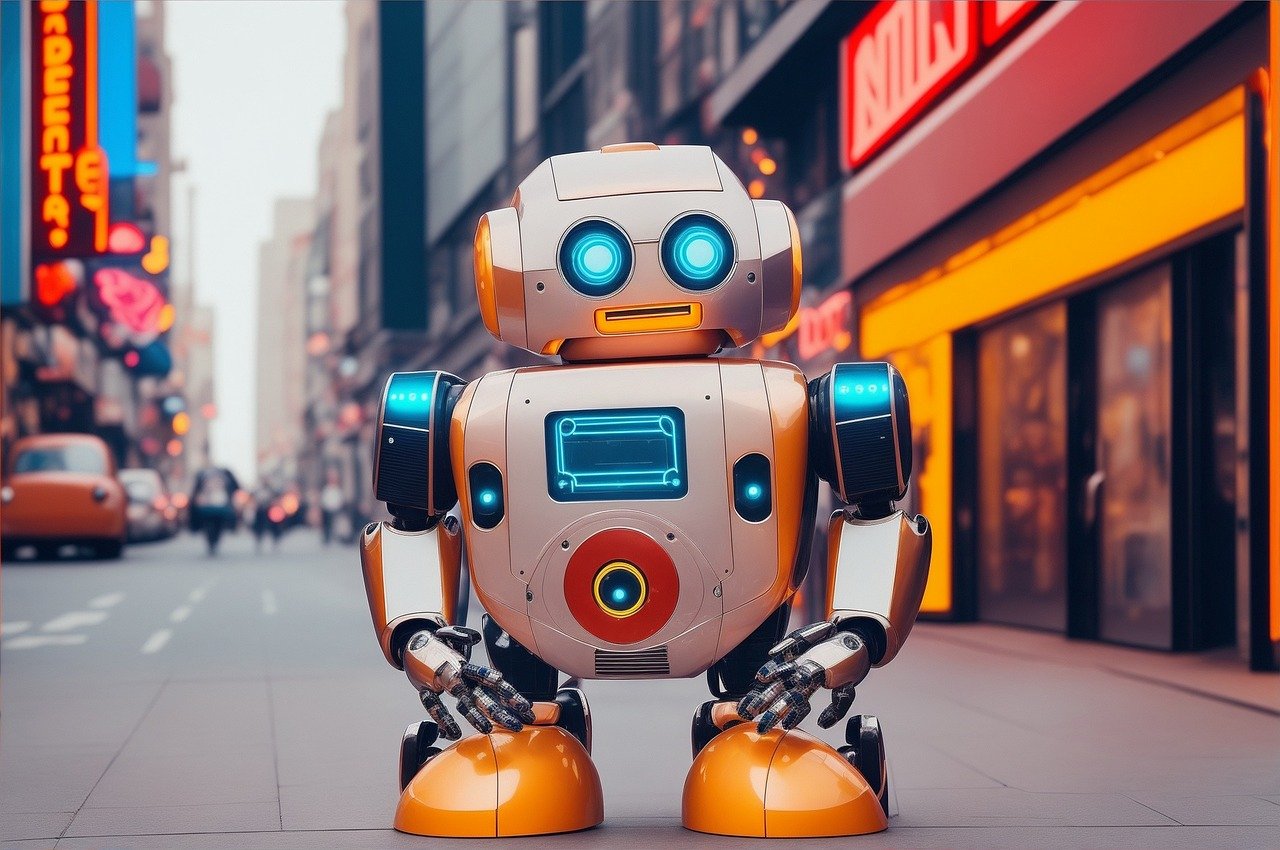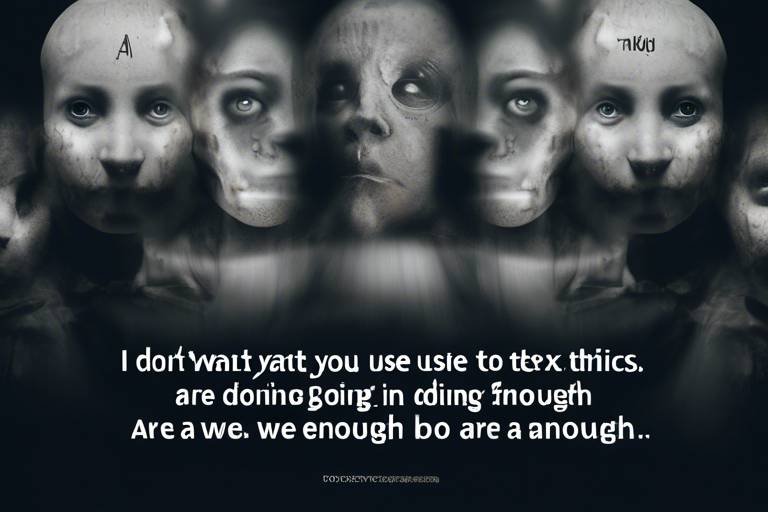Is AI an Ethical Minefield?
As we stand on the brink of a technological revolution, the question of whether artificial intelligence (AI) is an ethical minefield looms large. With every advancement in AI, we are presented with a double-edged sword—one that promises remarkable benefits while simultaneously posing significant ethical dilemmas. It’s a bit like holding a shiny new toy that can either bring joy or chaos, depending on how we choose to use it. The implications of AI stretch far and wide, affecting our society, privacy, and the very fabric of decision-making processes. So, what exactly makes AI such a complex ethical puzzle?
First and foremost, we must consider the impact of AI on human rights, autonomy, and equality. As AI systems become more integrated into our daily lives, the responsibilities of developers and users become increasingly pronounced. Are we, as a society, ready to grapple with the consequences of AI innovations? It's crucial to examine how these technologies can either uphold or undermine our fundamental rights. For instance, while AI can enhance efficiency in various sectors, it can also lead to job displacement and exacerbate social inequalities. The ethical implications are profound, and it’s a conversation we can no longer afford to ignore.
Moreover, the rapid evolution of AI technologies has sparked a debate about the moral responsibilities of those who create and implement these systems. Developers hold immense power, akin to modern-day wizards conjuring spells that can alter lives. But with great power comes great responsibility. Are they fully aware of the potential consequences of their creations? It’s essential for AI creators to engage in ethical reflection and consider the long-term effects of their innovations. In this age of information, where technology and ethics collide, we must ask ourselves: How do we ensure that AI serves humanity rather than the other way around?
As we delve deeper into this ethical minefield, it becomes evident that the stakes are high. The choices we make today will shape the future of AI and its role in our lives. It’s not just about creating smarter machines; it’s about fostering a society that values ethical considerations alongside technological advancements. In the following sections, we will explore various facets of AI ethics, including privacy concerns, data collection practices, and the biases lurking within algorithms. Buckle up, because this journey through the ethical landscape of AI is bound to be eye-opening.
Artificial intelligence raises significant ethical questions regarding its impact on human rights, autonomy, and equality. This section delves into the moral responsibilities of AI creators and the consequences of their innovations.
As AI systems collect vast amounts of personal data, privacy concerns become paramount. This section discusses the balance between technological advancement and the right to privacy in an increasingly surveilled world.
The methods used for data collection in AI can often infringe on individual privacy. This subsection examines how data is gathered, stored, and utilized, highlighting potential risks and ethical considerations.
Informed consent is crucial when it comes to data usage. This part explores whether users truly understand how their data is being used and the implications of consent in the digital age.
With the rise of AI, data security challenges have become more pronounced. This section looks at the vulnerabilities in AI systems and the ethical obligations of developers to protect user information.
AI algorithms can perpetuate existing biases, leading to unfair outcomes. This subsection discusses the sources of bias in AI and the ethical implications of biased decision-making processes.
Regulation plays a critical role in ensuring ethical AI development. This section outlines current regulatory frameworks and the necessary steps to create a more responsible AI landscape.
Establishing global standards for AI ethics is essential for consistency and fairness. This part discusses the efforts being made internationally to create a unified approach to ethical AI practices.
As AI technology evolves, so must the regulatory landscape. This section speculates on future regulatory developments and their potential impact on ethical AI deployment and innovation.
- What are the main ethical concerns surrounding AI?
Key concerns include privacy violations, bias in algorithms, and the potential for job displacement.
- How can developers ensure ethical AI practices?
By prioritizing transparency, accountability, and inclusivity in their design processes.
- What role do regulations play in AI ethics?
Regulations help establish standards and guidelines that promote ethical practices in AI development.

The Ethical Implications of AI
Artificial intelligence is not just a technological marvel; it’s a Pandora's box of ethical dilemmas waiting to be explored. As we dive into the realm of AI, we must grapple with profound questions about its impact on human rights, autonomy, and equality. With every algorithm developed, we inch closer to a future where machines may influence decisions that affect our lives. But at what cost? The moral responsibilities of AI creators are immense, and the consequences of their innovations could ripple through society in ways we can hardly imagine.
One of the most pressing ethical issues is the potential for AI to infringe upon individual freedoms. Imagine a world where your choices are subtly influenced by algorithms designed to predict your behavior. This isn’t science fiction; it’s already happening. AI systems are increasingly involved in decision-making processes that can determine everything from job applications to loan approvals. The question arises: who holds the accountability when these systems make mistakes? Are the developers responsible, or do the machines bear some of the blame?
Furthermore, the implications for equality cannot be overlooked. If AI systems are trained on biased data, they will inevitably perpetuate those biases. For instance, if a hiring algorithm is fed data that reflects historical hiring practices, it may favor candidates who fit a certain profile, thereby disadvantaging others. This not only raises questions about fairness but also about the very fabric of our society. Are we moving towards a future where decisions are made based on flawed data, leading to a cycle of inequality?
To navigate these ethical waters, we must consider the principles of transparency and accountability. Developers need to be open about how their algorithms work and the data they use. A lack of transparency can lead to a mistrust of AI systems, making it difficult for society to embrace these technologies. Imagine trying to trust a friend who never shares their thoughts or feelings; it’s challenging, right? Similarly, we need to understand the workings of AI to build trust in its capabilities.
As we ponder these ethical implications, it’s essential to engage in a dialogue that includes not just developers and technologists but also ethicists, policymakers, and the public. We need to establish a framework where ethical considerations are at the forefront of AI development. This framework can help ensure that technology serves humanity rather than undermines it. After all, technology should enhance our lives, not complicate them.
In conclusion, the ethical implications of AI are vast and complex. As we continue to innovate, we must remain vigilant and proactive in addressing these issues. The responsibility lies with all of us—developers, users, and society as a whole—to ensure that AI contributes positively to our world. Only then can we harness its full potential without compromising our core values.
- What are the main ethical concerns surrounding AI?
Ethical concerns include biases in algorithms, privacy issues, accountability for decisions made by AI, and the potential for infringing on human rights. - How can developers ensure their AI systems are ethical?
Developers can prioritize transparency, use diverse datasets, and engage with ethicists and the public during the development process. - What role does regulation play in AI ethics?
Regulation can help establish standards for ethical AI development, ensuring that technologies are created with public interest in mind.

Privacy Concerns in AI Development
In our increasingly digital world, the rise of artificial intelligence (AI) has brought about a plethora of advancements, but it has also raised serious privacy concerns. As AI systems become more pervasive, they collect an astonishing amount of personal data, ranging from our online behavior to our health records. This data is often used to train AI algorithms, which can lead to incredible innovations. However, the question remains: at what cost? The balance between technological progress and the right to privacy is a tightrope walk that society must navigate carefully.
One of the most pressing issues is the method of data collection. AI systems often rely on techniques that can be intrusive, gathering information without explicit user consent. For instance, many applications and services track user activity to improve their offerings, but how many users are truly aware of the extent of this tracking? The lack of transparency can lead to a sense of unease, as individuals may feel their personal lives are being monitored. This is especially concerning in a world where surveillance is becoming normalized.
Moreover, the concept of informed consent is critical in this discussion. Users frequently click through lengthy terms and conditions without fully understanding what they are agreeing to. Are we really giving informed consent when we have no idea how our data will be used? This raises ethical questions about whether companies are doing enough to ensure that users are aware of their data practices. In many cases, the fine print can obscure the true nature of data usage, leaving individuals vulnerable to exploitation.
As we dive deeper into the realm of AI, we also encounter significant data security challenges. With the vast amounts of data being collected, the risk of breaches increases dramatically. Hackers are constantly developing new methods to infiltrate systems, and when user data is compromised, the consequences can be devastating. From identity theft to financial fraud, the implications of poor data security practices can have far-reaching effects on individuals and society. Developers have an ethical obligation to prioritize data security and implement robust measures to protect user information.
In summary, while AI offers exciting possibilities, it is imperative to address the privacy concerns that accompany its development. The interplay between innovation and privacy is not just a technical issue; it is a moral one. As developers and users, we must advocate for transparency, informed consent, and stringent security measures to create a future where AI can thrive without compromising our fundamental rights. The road ahead is fraught with challenges, but by engaging in open dialogue and establishing ethical standards, we can navigate this complex landscape together.
- What are the main privacy concerns related to AI? The primary concerns include intrusive data collection methods, lack of informed consent, and data security vulnerabilities.
- How can users protect their privacy when using AI technologies? Users can read privacy policies, opt out of data collection when possible, and use privacy-focused tools and services.
- What role do developers play in ensuring user privacy? Developers must implement ethical data practices, prioritize user consent, and ensure robust security measures are in place to protect data.

Data Collection Practices
In our digital age, the way data is collected by artificial intelligence systems is a hot topic, and for good reason. These practices can often feel like an invasion of privacy, raising eyebrows and ethical concerns alike. Imagine walking through a store where every move you make is tracked, analyzed, and stored—sounds unsettling, right? That's the reality for many users today, as AI systems gather vast amounts of personal information to enhance their functionalities. But the question remains: how much do we really understand about what happens to our data once it’s collected?
AI systems often employ a variety of techniques to gather data, including:
- Cookies and Tracking Technologies: These are small files stored on your device that track your online behavior. They help companies understand user preferences but can also lead to invasive data profiling.
- Surveillance Cameras: In public spaces, AI-driven surveillance can collect visual data, raising questions about consent and the right to anonymity.
- Social Media Scraping: AI can analyze public posts and interactions to gather insights about individuals, often without their explicit consent.
While these methods can improve user experiences and personalize services, they also present significant risks. For instance, the more data AI collects, the more vulnerable it becomes to breaches and misuse. This leads us to a crucial ethical consideration: the responsibility of developers to ensure that data collection practices are transparent and respectful of user privacy. Are users genuinely aware of how their data is being utilized? Or are they unwittingly signing away their privacy rights?
Moreover, the ethical implications extend beyond mere data collection. The way this data is stored and processed can lead to further complications. For example, if sensitive information is leaked or misused, it can have devastating effects on individuals, ranging from identity theft to unwarranted surveillance. Therefore, it's essential for developers to implement robust data security measures and prioritize ethical considerations at every stage of data handling.
In conclusion, while data collection practices are integral to the functionality of AI, they come with a heavy ethical burden. As users, we must remain vigilant and informed about how our data is collected and used. The onus is also on developers and organizations to foster a culture of transparency, ensuring that ethical practices are not just an afterthought but a fundamental aspect of AI development.
- What types of data do AI systems typically collect? AI systems can collect various types of data, including personal identification information, browsing habits, location data, and even biometric data.
- How can I protect my privacy when using AI applications? You can protect your privacy by reviewing privacy settings, understanding data collection policies, and using tools that enhance your online anonymity.
- Are there regulations governing data collection practices? Yes, many countries have regulations like GDPR in Europe and CCPA in California that aim to protect user data and privacy rights.

Informed Consent
In the realm of artificial intelligence, is not just a legal formality; it is a fundamental ethical principle that demands our attention. The rapid advancement of AI technologies has led to a situation where individuals often find themselves surrendering their personal data without fully understanding the implications. It raises an important question: Are we truly aware of how our data is being used? In many cases, the answer is a resounding no.
When users interact with AI systems, they typically agree to terms of service that are lengthy, filled with jargon, and often overlooked. This creates a significant gap in understanding. To bridge this gap, developers must strive to provide clear, concise, and accessible information about data usage. Consider this analogy: would you sign a contract for a car without knowing its features, maintenance requirements, or even its price? Of course not! Yet, this is precisely what many do when they consent to data collection without fully comprehending the terms.
Moreover, the concept of informed consent in the digital age is evolving. It’s not just about agreeing to terms; it’s about understanding the how, why, and what of data usage. For instance, users should be informed about:
- What data is being collected
- How it will be used
- Who it will be shared with
- The measures in place to protect their data
This level of transparency is crucial. If users are unaware of how their data is being utilized, they cannot make informed decisions about their privacy. Furthermore, the ethical obligation of AI developers extends beyond just collecting consent; they must actively ensure that users are educated and empowered to understand the implications of their consent.
As we navigate this complex landscape, it’s vital to advocate for a shift toward more ethical practices in data collection. This includes creating user-friendly interfaces that clearly outline consent terms, employing visual aids to explain data usage, and even allowing users to customize their consent preferences. After all, informed consent should not be an afterthought; it should be at the forefront of AI development.
In conclusion, as we embrace the benefits of AI, we must also recognize the ethical responsibilities that come with it. Informed consent should be a cornerstone of AI ethics, ensuring that individuals are not only aware of their rights but also actively involved in the decision-making processes that affect their personal data.
- What is informed consent in AI? Informed consent in AI refers to the process of ensuring that users are fully aware of how their personal data is collected, used, and shared before they agree to it.
- Why is informed consent important? It is crucial for protecting individual privacy rights and ensuring that users have control over their personal information.
- How can developers improve informed consent practices? Developers can enhance informed consent by providing clear, accessible information, using plain language, and allowing users to customize their consent preferences.
- What are the implications of not having informed consent? Without informed consent, individuals may unknowingly give up their privacy rights, leading to potential misuse of their data and erosion of trust in AI systems.

Data Security Challenges
In today's digital landscape, the rise of artificial intelligence (AI) has introduced a plethora of that cannot be ignored. As AI systems become increasingly sophisticated, they often require vast amounts of data to function effectively. This data, which can include sensitive personal information, is a goldmine for cybercriminals and poses significant risks to individuals' privacy and security. Imagine your personal data as a treasure chest; when left unguarded, it becomes an easy target for thieves.
One of the primary challenges in data security is the vulnerability of AI systems. Many AI applications are built on complex algorithms that can be susceptible to hacking and manipulation. For instance, if a malicious actor gains access to an AI system, they could potentially alter its decision-making processes, leading to devastating consequences. This scenario is not mere speculation; there have been real-world incidents where AI systems were compromised, resulting in significant breaches of data security.
Moreover, the ethical obligations of developers come into play here. It is imperative that those who create AI technologies prioritize robust security measures. This means implementing advanced encryption techniques, regularly updating software to patch vulnerabilities, and conducting thorough security audits. However, the reality is that many companies prioritize speed and innovation over security, often leaving their systems exposed.
To illustrate the severity of these challenges, consider the following table that highlights some common vulnerabilities in AI systems:
| Vulnerability | Description | Potential Impact |
|---|---|---|
| Data Breaches | Unauthorized access to sensitive data. | Loss of privacy, financial damage, and reputational harm. |
| Adversarial Attacks | Manipulating AI inputs to produce incorrect outputs. | Misleading decisions in critical areas like healthcare and finance. |
| Insider Threats | Malicious actions taken by employees or contractors. | Data theft or sabotage of AI systems. |
Furthermore, as AI continues to evolve, so do the tactics used by cybercriminals. They are becoming more sophisticated, leveraging AI themselves to launch attacks that can bypass traditional security measures. This creates a vicious cycle where the advancements in AI technology can be both a boon and a bane. It's like a double-edged sword; while AI can enhance security protocols, it can also be exploited by those with malicious intent.
Ultimately, addressing these data security challenges requires a collective effort. Developers must commit to ethical practices, while users must remain vigilant about their data. Regularly updating passwords, being cautious about sharing personal information, and staying informed about potential threats are vital steps that individuals can take to protect themselves. In this ever-evolving landscape, the question remains: how do we strike the right balance between innovation and security? The answer lies in a proactive approach that prioritizes data protection at every stage of AI development.
- What are the main data security challenges in AI? The main challenges include data breaches, adversarial attacks, and insider threats.
- How can developers improve AI data security? Developers can enhance security by implementing encryption, conducting regular audits, and prioritizing security in the development process.
- What can users do to protect their data? Users should update passwords regularly, be cautious about sharing personal information, and stay informed about potential threats.

Bias in AI Algorithms
Artificial Intelligence (AI) has the potential to transform our world in unimaginable ways, but it also carries the heavy burden of bias. This bias often originates from the data used to train AI systems, which can reflect societal inequalities and prejudices. Imagine teaching a child using a book filled with outdated and biased information; the child would likely grow up with a skewed view of the world. Similarly, when AI learns from biased datasets, it can perpetuate and even amplify these biases in its decision-making processes.
One of the most alarming aspects of bias in AI algorithms is that it can lead to unfair outcomes in critical areas such as hiring, law enforcement, and lending. For instance, if an AI system is trained on historical hiring data that favored certain demographics, it might inadvertently discriminate against equally qualified candidates from underrepresented groups. This raises a fundamental question: How do we ensure that AI serves as a tool for equality rather than a mechanism for perpetuating discrimination?
To understand the sources of bias in AI, we need to consider a few key factors:
- Data Selection: The choice of data used to train AI models can introduce bias. If the data is not representative of the entire population, the AI may develop skewed perceptions.
- Labeling Bias: The way data is labeled can also contribute to bias. For example, if human annotators carry their own biases into the labeling process, those biases will be reflected in the AI's learning.
- Algorithm Design: The algorithms themselves can have inherent biases based on the assumptions and choices made by developers during the design phase.
Moreover, the consequences of biased AI algorithms can be dire. In the criminal justice system, for example, biased algorithms can lead to wrongful convictions or disproportionate sentencing. In hiring, they may result in qualified candidates being overlooked simply due to the color of their skin or gender. The ripple effects of these biases can further entrench societal inequalities, leading to a cycle that is hard to break.
Addressing bias in AI is not just a technical challenge; it is an ethical imperative. Developers and organizations must take proactive steps to mitigate bias in their AI systems. This includes implementing robust testing and validation processes, ensuring diverse teams are involved in the development, and continuously monitoring AI outputs for fairness. By acknowledging and addressing these biases, we can work towards a future where AI truly reflects the diversity and richness of human experience.
In conclusion, while AI holds tremendous potential, we must remain vigilant about the biases that can seep into these systems. The responsibility lies with both developers and users to advocate for fairness and equity in AI applications. Are we ready to tackle these challenges head-on and ensure that the future of AI is one that uplifts rather than oppresses?
- What is bias in AI algorithms? Bias in AI algorithms refers to systematic errors that result in unfair outcomes, often due to biased training data or flawed algorithm design.
- How can bias in AI be mitigated? Bias can be mitigated by using diverse datasets, ensuring transparency in algorithm development, and regularly auditing AI systems for fairness.
- Why is it important to address bias in AI? Addressing bias is crucial to prevent discrimination and ensure that AI systems serve all individuals equitably, promoting fairness in critical areas like hiring and law enforcement.

The Role of Regulation in AI Ethics
In a world increasingly dominated by technology, regulation plays a pivotal role in shaping the ethical landscape of artificial intelligence (AI). As AI systems become more integrated into our daily lives—from healthcare diagnostics to autonomous vehicles—the need for a robust regulatory framework has never been more critical. This framework is not just about imposing restrictions; it’s about fostering innovation while ensuring that ethical standards are upheld. The challenge lies in striking a balance between encouraging technological advancement and safeguarding public interest.
Currently, various regulatory bodies across the globe are grappling with the complexities of AI ethics. For instance, the European Union has been at the forefront of AI regulation, proposing the AI Act, which aims to categorize AI applications based on risk levels and implement stringent guidelines for high-risk systems. This approach is vital because it acknowledges that not all AI applications pose the same level of threat to human rights and societal norms. By distinguishing between low-risk and high-risk applications, regulators can tailor their strategies more effectively. Below is a brief overview of the proposed risk categories:
| Risk Level | Description | Examples |
|---|---|---|
| Minimal Risk | AI systems that pose little or no risk to rights or safety. | Spam filters, AI-based games |
| Limited Risk | AI systems that require transparency obligations. | Chatbots, recommendation systems |
| High Risk | AI systems that could significantly impact individuals' rights. | Facial recognition, credit scoring |
| Unacceptable Risk | AI systems that pose a clear threat to safety or fundamental rights. | Social scoring systems |
This classification system not only helps in managing risks but also sets a precedent for other nations to follow. However, one of the significant challenges in AI regulation is the rapid pace of technological advancement. By the time regulations are drafted and implemented, the technology may have evolved, rendering the rules obsolete. This creates a constant tug-of-war between innovation and regulation, where developers might feel stifled by bureaucratic processes, while regulators fear the potential misuse of unchecked AI technologies.
Moreover, the global nature of AI development complicates regulatory efforts. Different countries have varying standards and ethical norms, leading to a fragmented regulatory landscape. For instance, while the EU is pushing for strict regulations, other regions, like parts of Asia and North America, may adopt a more laissez-faire approach. This inconsistency can create a race to the bottom, where companies relocate to jurisdictions with less stringent regulations, undermining ethical standards globally.
To combat this, there’s a growing call for establishing global standards for AI ethics. Organizations like the IEEE and the OECD are working towards creating frameworks that can be adopted internationally. These standards aim to ensure that AI systems are developed responsibly, emphasizing transparency, accountability, and fairness. However, achieving consensus among nations with differing priorities and cultural values is no small feat.
As we look to the future, the role of regulation in AI ethics will continue to evolve. It’s essential for regulatory bodies to remain flexible and adaptive, embracing collaboration with tech companies, ethicists, and the public. By doing so, we can create an environment where AI can thrive, while also ensuring that ethical considerations are at the forefront of innovation. The future of AI regulation must not only focus on preventing harm but also on promoting the positive potential of AI to improve lives and foster societal growth.
- What is the purpose of AI regulation?
AI regulation aims to ensure that AI technologies are developed and used responsibly, protecting individuals' rights and promoting ethical standards. - Why is global cooperation important in AI regulation?
Global cooperation helps create consistent standards that can prevent companies from exploiting regulatory loopholes in less stringent jurisdictions. - How can individuals contribute to ethical AI development?
Individuals can advocate for transparency in AI technologies, support ethical companies, and educate themselves about AI implications in their lives.

Global Standards for AI Ethics
Establishing is not just a lofty goal; it’s an essential necessity in our rapidly advancing technological landscape. As artificial intelligence continues to evolve, the implications of its use become increasingly profound, affecting everything from our daily lives to the very fabric of society. Without a unified ethical framework, we risk creating a fragmented approach that could lead to inconsistencies, biases, and even harmful outcomes. So, what does it mean to have global standards for AI ethics?
Firstly, global standards aim to create a cohesive understanding of ethical AI practices across different regions and cultures. As AI technologies are developed and deployed worldwide, varying ethical norms can lead to confusion and conflict. For instance, what is considered acceptable in one country might be viewed as unethical in another. Therefore, a set of universally recognized standards can help bridge these gaps, ensuring that AI development aligns with fundamental human rights and values.
Furthermore, these standards would provide a foundation for accountability and transparency. Developers and organizations would be required to adhere to established guidelines, which would, in turn, foster trust among users. Imagine a world where consumers can confidently engage with AI technologies, knowing that their rights are protected and that the systems are designed with ethical considerations in mind. This trust is crucial, especially as AI systems increasingly influence critical areas such as healthcare, finance, and law enforcement.
However, creating these global standards is no small feat. It involves collaboration between governments, tech companies, and civil society. Various organizations, such as the Institute of Electrical and Electronics Engineers (IEEE) and the European Commission, have already begun laying the groundwork for ethical AI guidelines. These initiatives emphasize the importance of fairness, accountability, and transparency in AI systems. But we must ask ourselves: are these efforts sufficient? How can we ensure that these standards are not just theoretical but are actively implemented and enforced?
One of the challenges in establishing these standards lies in the diversity of stakeholders involved. Each group has its own interests and priorities, which can complicate consensus-building. For example, tech companies might prioritize innovation and market competitiveness, while advocacy groups focus on protecting individual rights and promoting social justice. Balancing these interests requires open dialogue and a willingness to compromise, which can be difficult in practice.
Moreover, the rapid pace of AI development poses another challenge. As new technologies emerge, existing standards may quickly become outdated. To combat this, we need a dynamic regulatory framework that can adapt to changes in technology and societal values. This could involve regular reviews and updates to the standards, ensuring they remain relevant and effective in guiding ethical AI practices.
In conclusion, establishing global standards for AI ethics is a critical step toward ensuring that artificial intelligence serves humanity positively and equitably. While there are significant challenges ahead, the potential benefits—such as increased trust, accountability, and fairness—are well worth the effort. As we move forward, it is essential that all stakeholders collaborate to create a unified ethical framework that not only addresses current concerns but also anticipates future developments in the ever-evolving world of AI.
- Why are global standards for AI ethics necessary?
Global standards ensure consistency and fairness in AI practices across different regions, protecting human rights and fostering trust among users. - Who is involved in creating these standards?
Governments, tech companies, and civil society organizations collaborate to establish ethical guidelines for AI development. - What challenges exist in establishing these standards?
Diverse stakeholder interests and the rapid pace of AI development can complicate the creation and implementation of effective standards. - How can we ensure these standards remain relevant?
A dynamic regulatory framework that allows for regular reviews and updates is essential to keep the standards aligned with technological advancements.

The Future of AI Regulation
The future of AI regulation is a topic that sparks intense debate among technologists, ethicists, and lawmakers alike. As artificial intelligence continues to evolve at breakneck speed, the question arises: how can we keep pace with its growth while ensuring that ethical standards are met? The reality is that the landscape of AI regulation is still very much in its infancy, and the path forward is fraught with challenges and opportunities.
One of the most pressing issues is the need for adaptive regulation. Traditional regulatory frameworks often struggle to keep up with rapid technological advancements, leading to gaps that can be exploited. Imagine trying to catch a train that’s already left the station; that’s where we find ourselves with AI. Regulators need to be more agile, adopting a proactive approach that anticipates changes in technology rather than merely reacting to them.
Moreover, the complexity of AI systems necessitates a multi-faceted regulatory approach. This means involving various stakeholders, including developers, users, and governments, in the discussion. Each group brings unique perspectives and expertise that can enrich the regulatory framework. For instance, developers can provide insights into the technical capabilities and limitations of AI, while users can share their experiences and concerns regarding privacy and bias.
In addition to collaboration, establishing global standards for AI ethics is crucial. The internet knows no borders, and neither should our regulations. Countries around the world are beginning to realize that a unified approach to AI regulation can help mitigate risks associated with its deployment. Efforts are already underway, with organizations like the OECD and the European Union leading the charge in creating guidelines that promote ethical AI practices. However, achieving consensus among diverse nations with varying cultural values and legal systems is no small feat.
As we look to the future, the idea of self-regulation within the tech industry is also gaining traction. Companies are increasingly being called upon to hold themselves accountable for the ethical implications of their technologies. This could take the form of internal audits, ethical review boards, or even public commitments to transparency. But can we trust these companies to regulate themselves? That’s a question worth pondering, as the stakes are incredibly high.
Looking ahead, we can expect to see a shift towards more comprehensive regulations that encompass not just the technology itself but also the broader societal implications. This could involve:
- Stricter guidelines on data privacy and security
- Mandatory audits for AI systems to ensure fairness and transparency
- Regular updates to regulations as technology evolves
Ultimately, the future of AI regulation will require a careful balance between fostering innovation and protecting the rights of individuals. It’s a tightrope walk, and one misstep could lead to significant consequences. As we navigate this uncharted territory, it’s essential that we keep the lines of communication open among all stakeholders. After all, the goal is not just to regulate AI but to ensure it serves humanity in a fair and equitable manner.
- What is the main goal of AI regulation?
The main goal is to ensure that AI technologies are developed and used ethically, protecting individual rights while fostering innovation. - Why is global cooperation necessary in AI regulation?
AI operates across borders, and a unified approach can help mitigate risks and ensure consistency in ethical standards. - Can companies self-regulate effectively?
While self-regulation can promote accountability, it requires transparency and commitment to ethical practices to be truly effective.
Frequently Asked Questions
- What are the main ethical concerns surrounding AI?
The ethical concerns surrounding AI are vast and multifaceted. They include issues related to human rights, autonomy, and equality. Developers face the moral responsibility of ensuring their creations do not infringe on individual rights or perpetuate inequality. As AI systems become more integrated into daily life, the implications of these ethical dilemmas become even more pronounced.
- How does AI impact privacy?
AI significantly impacts privacy due to its reliance on vast amounts of personal data. The challenge lies in balancing technological advancement with the right to privacy. With AI systems constantly collecting and analyzing data, individuals often remain unaware of how their information is used, raising concerns about consent and data ownership.
- What is informed consent in the context of AI?
Informed consent is the process by which users agree to the collection and use of their data after being fully informed about how it will be utilized. In the digital age, many users may not fully understand the implications of their consent, which raises ethical questions about transparency and user awareness in AI applications.
- What are the risks associated with data collection in AI?
Data collection practices in AI can infringe on individual privacy and expose users to various risks, including data breaches and misuse of personal information. Ethical considerations must be taken into account to ensure that data is gathered responsibly and that users' rights are protected.
- How can bias in AI algorithms affect decision-making?
Bias in AI algorithms can lead to unfair outcomes, as these systems may perpetuate existing societal biases. This can have serious implications in areas like hiring, law enforcement, and lending, where biased decisions can adversely affect individuals and communities. Recognizing and mitigating bias is crucial for ethical AI deployment.
- What role does regulation play in AI ethics?
Regulation is vital for ensuring that AI is developed and deployed ethically. It helps create a framework within which developers must operate, promoting accountability and transparency. Current regulatory frameworks are evolving, and additional measures are needed to keep pace with rapid technological advancements.
- Are there global standards for AI ethics?
Efforts are underway to establish global standards for AI ethics to ensure consistency and fairness across borders. These standards aim to provide guidelines that can help developers create responsible AI systems that respect human rights and promote social good.
- What does the future hold for AI regulation?
The future of AI regulation is likely to involve more comprehensive frameworks that adapt to emerging technologies. As AI continues to evolve, regulators will need to address new ethical challenges and ensure that innovations benefit society as a whole, while safeguarding individual rights.


















